A Bosnian court on Wednesday sentenced Milorad Dodik, the pro-Russia Bosnian Serb leader, to one year in prison and barred him from engaging in political activities for six years due to his separatist actions, as tensions mount in the fragile Balkan state.
The landmark ruling by the court in Sarajevo came after a yearlong trial against Dodik, the president of a Serb-run entity in Bosnia-Herzegovina called Republika Srpska (Serb Republic), on charges that he disobeyed the top international envoy overseeing peace in the Balkan country.
The judgment becomes final after the appeal process. Prosecutors had earlier called for a jail term of nearly five years and a 10-year ban on holding public office.
Neither Dodik nor his lawyers were present in court during the sentencing on Wednesday. He has said that he would disobey any conviction and threatened “radical measures” in response, including the eventual secession of the Republika Srpska from the rest of the country.
Dodik was indicted in 2023 for signing laws that suspended rulings by the constitutional court and by international peace envoy Christian Schmidt, whose role was created in 1995 to stop the Balkan country from slipping back into war.
The verdict could trigger a crisis in Bosnia, which suffered a 1992-95 war that left 100,000 people killed and displaced millions. The U.S.-sponsored Dayton Accords ended the war nearly three decades ago and created two regions, Republika Srpska (RS) and a federation of Croats and Bosnian Muslims or Bosniaks. There is also a small and neutral Brcko district in the north.
The two regions were given wide autonomy, but kept some joint institutions, including the army, the top judiciary and the tax administration.
They have their own presidency, parliament and government, as well as their own police and judiciary. The Bosniak-Croat Federation (FBiH) is further split into ten cantons, each with its own government and parliament. Sarajevo is the capital of the country and of the Bosniak-Croat Federation, while Banja Luka is the Bosnian Serb administrative seat.
Bosnia also has a rotating three-member presidency made up of Bosniak, Serb and Croat members who rotate in the position of the presiding member. It is mostly a ceremonial role, however.
The 1992-95 war erupted when the Serbs rebelled against the country’s independence from the former Yugoslavia and moved to form a mini-state of their own with the aim of uniting it with neighboring Serbia.
According to the 2013 census, the Bosniak-Croat Federation had a population of nearly 2.22 million and Republika Srpska almost 1.23 million, but the country has experienced heavy population loss. Today it is believed to have under 3 million people.
“There is no more Bosnia-Herzegovina as of today,” Dodik told a crowd of supporters in Banja Luka.
“I need the support of the people and I will go to the end.”
Bosniak official Camil Durakovic said the verdict against Dodik showed that “no individual is above the state and that everyone will be held accountable for their actions.”
Dodik has repeatedly called for the separation of the Serb-run half of Bosnia, which prompted the United States and the United Kingdom to impose sanctions against him and his close allies. Dodik is also accused of corruption and pro-Russia policies.
Before the verdict, Dodik said a ruling against him could “strike a death blow to Bosnia-Herzegovina” and that he would seek to split the country if the ruling goes against him. He warned that the Serb Republic would block the work of Bosnia’s central government and withdraw from the state judiciary and joint armed forces.
“They say I am guilty, but now people here will say why I am not guilty,” Dodik told the crowd in Banja Luka shortly after the verdict was announced. “There is no reason to worry. I have learned to deal with tougher situations. It is important that you are here.”
In Serbia, populist President Aleksandar Vucic called an urgent session of the national security council there.
Dodik, who has close ties with Russia, has rejected the indictment as politically motivated. He is unlikely to be sent to prison as, under criminal law, Bosnians can pay a fine instead of facing jail time if the sentence is no more than one year.
Dodik told the crowd in Banja Luka that he spoke on the phone with Vucic and with Hungary’s Prime Minister Viktor Orban, whom he called a friend.
“We made fun of those in Sarajevo,” he said.
He invited Vucic to come to Banja Luka to discuss “what we are going to do next.”
Another ally, Russia, condemned the court’s ruling as “unacceptable”.
“The prosecution of Milorad Dodik is purely political in its nature, inspired from the West,” the Russian Foreign Ministry said in a statement sent via the Russian embassy in Sarajevo. “This will be a strike on the stability in the Balkan region as a whole.”
Dodik has two weeks to appeal the ruling, which also states that he cannot rule for six years. Wednesday’s ruling will become official when the appeal process is over, legal experts said.
Dodik said the Bosnian Serb parliament would vote later Wednesday to reject the legal proceedings against him. Lawmakers will also approve several laws banning the work of central Bosnian legal institutions from the Serb-controlled half of Bosnia, he said.
He has repeatedly clashed with top international envoy Schmidt and declared his decisions illegal in Republika Srpska. The Dayton peace agreement envisages that the high representative can impose decisions and change laws in the country.
“We must be cheerful, I am sentenced to one year for their crap and their jail,” Dodik said, flanked by officials from the RS and former New York City mayor Rudy Giuliani.
“I am guilty of nothing,” he added, lambasting Schmidt with insults.
Like many Serbs, Dodik says Schmidt has no legal authority because his appointment was not endorsed by the United Nations Security Council.
Schmidt on Tuesday had sought to reassure the public.
“The international community remains firmly committed to peace and stability in this region. Bosnia-Herzegovina is not negotiable,” said the envoy after a meeting in Sarajevo.
The original indictment came after Dodik signed two laws that Schmidt had revoked, claiming they defied Bosnia’s constitution and the terms of the peace deal.
One law suspended rulings by Bosnia’s constitutional court and the second ended publication of the peace envoy’s decrees and laws in the Republika Srpska’s official gazette.
Milos Lukic, acting director of the official gazette, was acquitted of the same charges on Wednesday.

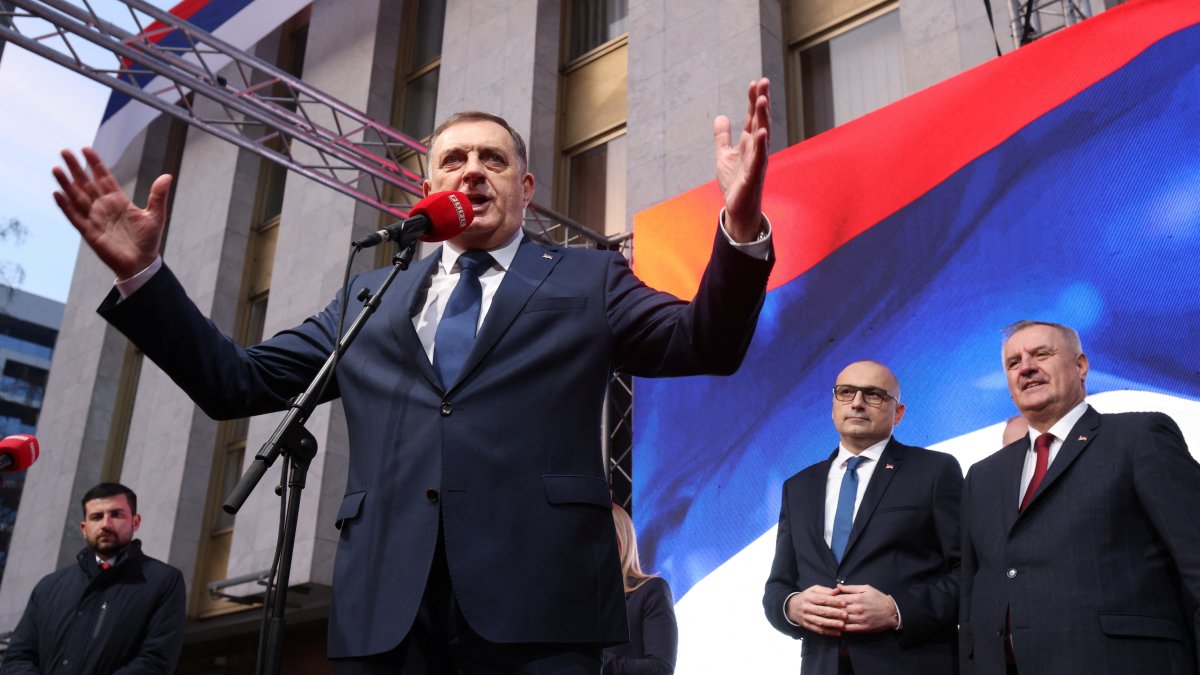
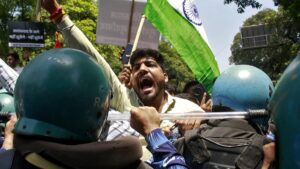





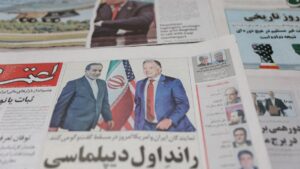



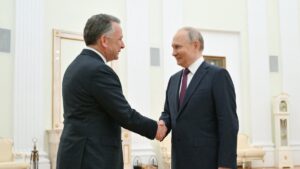
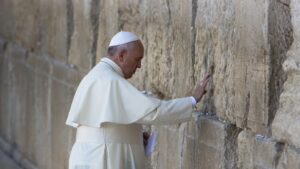
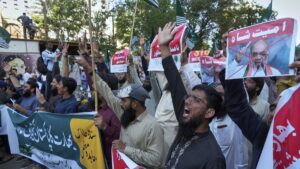


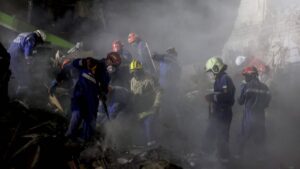

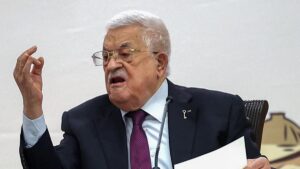


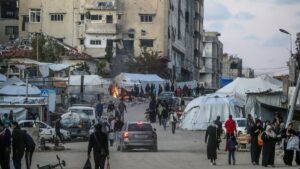







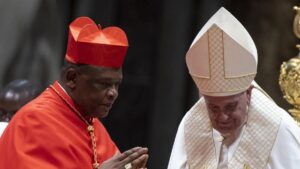
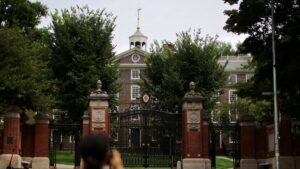
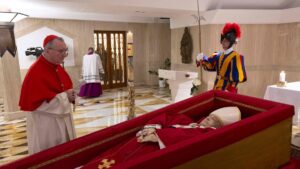
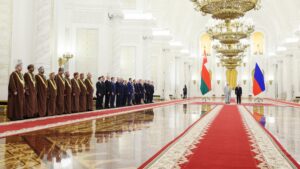
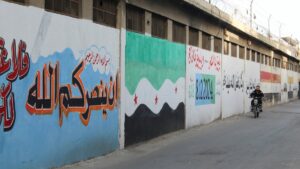








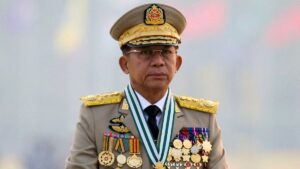





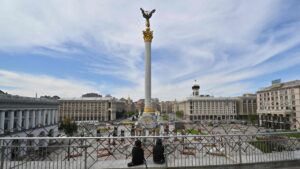


Be First to Comment